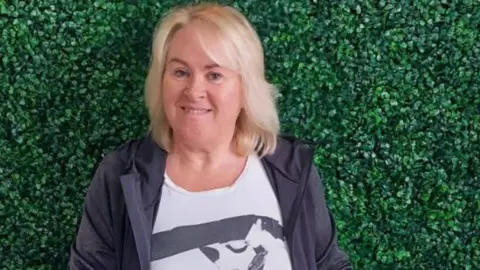Record numbers with diabetes in 'hidden crisis'
 Sandy Pine
Sandy PineOne in five adults in Wales is living with diabetes or prediabetes, new data suggests.
Some 226,000 people have diabetes in Wales, while another estimated 269,000 people have prediabetes, which, left untreated, can develop into type 2 diabetes.
Diabetes UK, which released the figures, said the figures highlighted a "hidden health crisis" and called on the Welsh government to tackle the crisis "head-on".
The Welsh government said they were very concerned about the rising levels and that they have invested £1m a year to support a prevention programme as part of a 10-year strategy.
Sandy Pine, 63, from Cardiff, previously developed type 2 diabetes after going through cancer treatment.
"I gained a lot of weight, especially around the middle and the tummy area," she said.
Ms Pine said, despite regularly being tired and thirsty, the condition had not crossed her mind.
Her GP wanted to prescribe her medication, but Ms Pine decided she would try to tackle it through lifestyle changes.
"I'm two stone lighter after nine months and I am not diabetic anymore," she said, adding that support from her friends at a nutrition club had helped her.
About 90% of people who are living with diabetes in Wales have type 2 diabetes, Rachel Burr, national director for Diabetes UK Cymru, told BBC Radio Wales Breakfast.
Type 2 diabetes has a wide variety of causes including age, ethnicity and family history, but one of the leading risk factors is living with obesity.
Changes to a person's lifestyle and support to help delay or prevent the onset of type 2 diabetes is key, Ms Burr said, as well as treatment once diagnosed with the condition.
Type 1 diabetes, a lifelong condition which cannot be prevented and for which there is no cure, affects 8% of people in Wales.
About 60,000 people are also living with undiagnosed type 2 diabetes, Ms Burr said.
 Wendy Gane
Wendy GaneWendy Gane, co-founder Cwmbach diabetic support group in Rhondda Cynon Taf, also said people with diabetes were often not aware of the care they should be receiving.
"We need to catch people with all kinds of diabetes as early as possible," Ms Gane said.
"I can't stress enough the importance of peer support. You really do need to be able to chat to some people who have actually gone through what you're going through," she said.
Ms Gane said more support was also needed in the community to help people eat healthily.
"You need to know the things you can eat and to make healthy choices.
"But that is dependent on what money comes in. We have people here who have to go to food banks," she said.
She added that in areas of deprivation such as the Cynon Valley where she works, the prevalence of diabetes was high, making the need for support in the community even higher. This could include cooking sessions or advice on how to eat healthily on a budget, she said.
"If you haven't got much money, life is not so easy to make the healthiest of choices," she said.
Frightening rise in prevalence
Ms Burr said the rise of prevalence of diabetes was "really quite frightening at the moment".
"For people living with diabetes, it's a life-changing thing. It affects they day-to day life all the time," said Ms Burr.
"Diabetes can go on to cause some really quite horrible complications; things like heart attacks, like strokes, kidney disease, sight loss," she added.
The charity has written an open letter to the Cabinet Secretary for Health and Social Care Jeremy Miles, calling on the Welsh government to "tackle this crisis head-on".
It also wants investment in care in order to help prevent complications and the provision of annual diabetes checks.
A focus on improving the food environment in Wales, which the government is already tackling through the Healthy Weight: Healthy Wales strategy, was crucial, Ms Burr said.
"We need to urgently find those people who are unaware that they are living with diabetes or type 2 diabetes, making sure they are getting the right support at the earliest opportunity."
